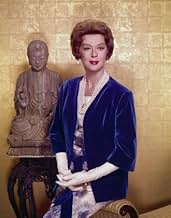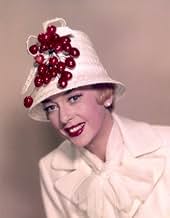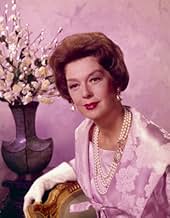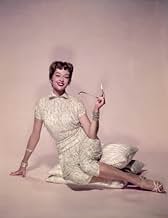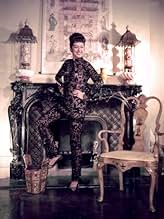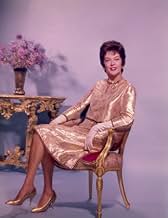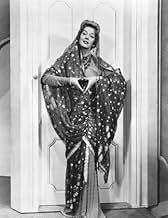CALIFICACIÓN DE IMDb
7.9/10
13 k
TU CALIFICACIÓN
Un huérfano se va a vivir con su tía de espíritu libre. El conflicto surge cuando el albacea de la herencia de su padre se opone al estilo de vida de la tía.Un huérfano se va a vivir con su tía de espíritu libre. El conflicto surge cuando el albacea de la herencia de su padre se opone al estilo de vida de la tía.Un huérfano se va a vivir con su tía de espíritu libre. El conflicto surge cuando el albacea de la herencia de su padre se opone al estilo de vida de la tía.
- Dirección
- Guionistas
- Elenco
- Nominado a 6 premios Óscar
- 5 premios ganados y 12 nominaciones en total
- Dirección
- Guionistas
- Todo el elenco y el equipo
- Producción, taquilla y más en IMDbPro
Opiniones destacadas
When "Auntie Mame" was first published, I read and re-read it (and its sequel, "Around the World with Auntie Mame") for several summers. Believe it or not, the books are even funnier than the film. They were not "memoirs," though that was the PR at the time. Edward Everett Tanner, or "Patrick Dennis," ultimately admitted as much. Auntie Mame was a creation from Tanner's own talented imagination.
No one ever has, or ever will, embody Auntie Mame as well as Rosalind Russell, who, by the time her Broadway performance in the role was filmed, had honed her portrayal to one of the finest in American theatre and film.
Listen to her vocal technique: from high girlish squeals to basso-profundo sarcasm.
Or watch her remarkable body language throughout -- from grande dame theatricality to lowbrow burlesque.
Russell's supporting players are magnificent -- from the 12-year old Jan Handzlik, through Coral Browne, Peggy Cass, Forrest Tucker, Fred Clark, Patrick Knowles, Connie Gilchrist, Yuki Shimoda, Robin Hughes, Roger Smith, Pippa Scott -- and, my own particular favorites who almost, but not quite, steal their scenes from Miss Russell: Willard Waterman, Lee Patrick and Joanna Barnes as the unforgettable Upsons.
George James Hopkins' brilliant sets and set design, and Orry-Kelly's amazing costumes, along with Branislau Kaper's score and Morton Da Costa's direction are like Tiffany settings, showing off this flawless cast at the top of their form.
Lawrence and Lee's original Broadway script was adapted by Betty Comden and Adolph Green, whose main contribution would appear to be the hydraulic furniture at the final dinner party.
The famous line, originally from the Broadway play and not found in the novel, is "Life is a banquet! And most poor sons-of-bitches are starving to death!" "Damn" and "hell" both are heard in the film: but "sons-of-bitches" was apparently too strong for the MPAA in 1958.
Is the film dated? I suppose. In the same way that "Citizen Kane" is dated, or "Some Like It Hot." It's also timeless. And Miss Russell's performance, here at the zenith of her long and distinguished comedic and dramatic career (Eugene O'Neill's "Mourning Becomes Electra," anybody?) is an acting lesson unto itself.
No one ever has, or ever will, embody Auntie Mame as well as Rosalind Russell, who, by the time her Broadway performance in the role was filmed, had honed her portrayal to one of the finest in American theatre and film.
Listen to her vocal technique: from high girlish squeals to basso-profundo sarcasm.
Or watch her remarkable body language throughout -- from grande dame theatricality to lowbrow burlesque.
Russell's supporting players are magnificent -- from the 12-year old Jan Handzlik, through Coral Browne, Peggy Cass, Forrest Tucker, Fred Clark, Patrick Knowles, Connie Gilchrist, Yuki Shimoda, Robin Hughes, Roger Smith, Pippa Scott -- and, my own particular favorites who almost, but not quite, steal their scenes from Miss Russell: Willard Waterman, Lee Patrick and Joanna Barnes as the unforgettable Upsons.
George James Hopkins' brilliant sets and set design, and Orry-Kelly's amazing costumes, along with Branislau Kaper's score and Morton Da Costa's direction are like Tiffany settings, showing off this flawless cast at the top of their form.
Lawrence and Lee's original Broadway script was adapted by Betty Comden and Adolph Green, whose main contribution would appear to be the hydraulic furniture at the final dinner party.
The famous line, originally from the Broadway play and not found in the novel, is "Life is a banquet! And most poor sons-of-bitches are starving to death!" "Damn" and "hell" both are heard in the film: but "sons-of-bitches" was apparently too strong for the MPAA in 1958.
Is the film dated? I suppose. In the same way that "Citizen Kane" is dated, or "Some Like It Hot." It's also timeless. And Miss Russell's performance, here at the zenith of her long and distinguished comedic and dramatic career (Eugene O'Neill's "Mourning Becomes Electra," anybody?) is an acting lesson unto itself.
This is one of the best films I have EVER seen, and I watch a lot of films, as I am sure most of you do. First, it is an excellent adaptation of the book. They managed to follow the story line extremely well. Yes, somethings were left out, but all and all, they did a great job. Second, Rosaline Russell rocks! It doesn't matter what character she plays, she is fantastic, but she IS Mame, nobody can do it like her. Forget about the musical version (MAME) with Lucille Ball ( who is a great actress in her own right, but certainly not in the same ballpark with Ms. Russell). Third, it is not only funny, but heartwarming. The relationship between Mame and Patrick speaks volumes about what love should be, completely accepting of who the other person is, even if you don't always agree with them or like what they do. Fantastic family film, fun for everyone.
From the cartoon kaleidoscope opening to the last walk up the staircase for Mame Dennis, this comically-contrived and highly theatrical movie version of the celebrated Broadway success is nevertheless pleasing in almost every sense. Director Morton DaCosta, who also helmed the stage version, uses the theatricality of the piece to his advantage, giving the proceedings the shiny look and feel of a holiday bauble. The movie takes off running, bursting with chatter and frivolity, and Rosalind Russell is a great crazy-quilt hostess, often going in three directions at once. The story of an orphaned lad in 1928 who goes to live with his batty aunt in New York City started life as a book by Patrick Dennis, with Russell playing the lead once it was turned into a play. The film-version doesn't try to disguise the stage origins, but then it doesn't really have to; DaCosta keeps the pacing so brisk, with characters entering and exiting rapidly, that initially the viewer may feel as though something important may have been missed. The picture isn't loaded down with artificial charm. On the contrary, the romantic sub-plot between Russell and oil tycoon Forrest Tucker (which, again, is quick--in and out) is genuinely sweet (this is Tucker's triumph as much as it is Russell's) and the supporting players are impeccably well-cast, bouncing off each other like frenetic ornaments. While the plot does slip into an episodic structure (and does feel a bit lengthy), the smooth maneuvering of characters and quirks and hang-ups and hang-overs is an awful lot of fun. As for Russell, she gives shading and feeling to this woman; her exuberance can be taken as a put-on (for laughs), yet we never lose sight of Mame Dennis as a ballsy, bright lady, and she never lapses into bitchiness. Mame may have been real, or maybe just a literary confection, but she isn't a phony. She believes life is a banquet, and gets us to believe it too. *** from ****
Sometimes you see a movie and you know that the actor or actress in it was born to play that part.
Clark Gable in Gone with the Wind
Bette Davis in All About Eve
Barbra Streisand in Hello, Dolly
Rosalind Russell in Auntie Mame
I love Russell and the parts she played. She was a liberated woman before the rest of the world knew that women needed to be liberated.
But in Auntie Mame she reached her peak. Mame is so vibrant and alive. She flaunts every one of Mame's eccentricities without stepping over the line into caricature. She also brings alive Mame's decency, compassion and tolerance. When I watch it, I almost feel ashamed of myself for being such a stick in the mud.
I enjoyed the musical with Lucille Ball, but all the way through it - I wanted it to be Rosalind Russell playing the part. It takes very little imagination on my part to hear her singing the songs. Rosalind, you are "just sensational" as Mame.
Clark Gable in Gone with the Wind
Bette Davis in All About Eve
Barbra Streisand in Hello, Dolly
Rosalind Russell in Auntie Mame
I love Russell and the parts she played. She was a liberated woman before the rest of the world knew that women needed to be liberated.
But in Auntie Mame she reached her peak. Mame is so vibrant and alive. She flaunts every one of Mame's eccentricities without stepping over the line into caricature. She also brings alive Mame's decency, compassion and tolerance. When I watch it, I almost feel ashamed of myself for being such a stick in the mud.
I enjoyed the musical with Lucille Ball, but all the way through it - I wanted it to be Rosalind Russell playing the part. It takes very little imagination on my part to hear her singing the songs. Rosalind, you are "just sensational" as Mame.
Rosalind Russell -IS- Auntie Mame and there is no doubt in my mind that she being cast in the role was a perfect choice. I read Dennis' book and I have to stress that anyone who loves this film but who has not read the book should read it. I think they did a great job in adapting the novel to film although I could imagine the great temptation to include the very racy parts of the novel. If they did include them, the "G" rating would probably have needed to be changed to "R". One of my favorite lines in the film is delivered so expertly by actress Coral Browne (Vera Charles), who upon being wakened out of a drunken sleep (with bottle still in hand) looks out the window at the sun and says "Ohhh---that moon is bright". Another favorite line delivered by Russell (in Mame's comment about Vera Charles' phony English accent) "When your from Pittsburgh, you have to do something". Rosalind Russell brought such magic to the character of Auntie Mame so much so, that I wish I had an Aunt like her. Auntie Mame helps stress the point to appreciate diversity in life and to live life to the fullest. I have often chosen to watch my copy of this film when feeling low and I can tell you it is a spirit lifter.
¿Sabías que…?
- TriviaRosalind Russell broke her ankle in the first take of the scene where she comes flying down the stairs in the gown with the capri pants and shooting had to be delayed until she recovered.
- ErroresIn 1929 Mame and Lindsey talk about what Dr. Spock has to say on child rearing, a decade before his famous book was published.
- Citas
Mame Dennis: Oh, Agnes, where is your spine? Here you've been taking my dictation for weeks and you don't get the message of my book. Live, that's the message!
Agnes Gooch: Live?
Mame Dennis: Yes! Life is a banquet and most poor suckers are starving to death!
- ConexionesFeatured in AFI's 100 Years... 100 Laughs: America's Funniest Movies (2000)
Selecciones populares
Inicia sesión para calificar y agrega a la lista de videos para obtener recomendaciones personalizadas
- How long is Auntie Mame?Con tecnología de Alexa
Detalles
- Fecha de lanzamiento
- País de origen
- Idiomas
- También se conoce como
- Auntie Mame
- Locaciones de filmación
- Productora
- Ver más créditos de la compañía en IMDbPro
Taquilla
- Presupuesto
- USD 2,240,000 (estimado)
- Tiempo de ejecución
- 2h 23min(143 min)
- Relación de aspecto
- 2.35 : 1
Contribuir a esta página
Sugiere una edición o agrega el contenido que falta


